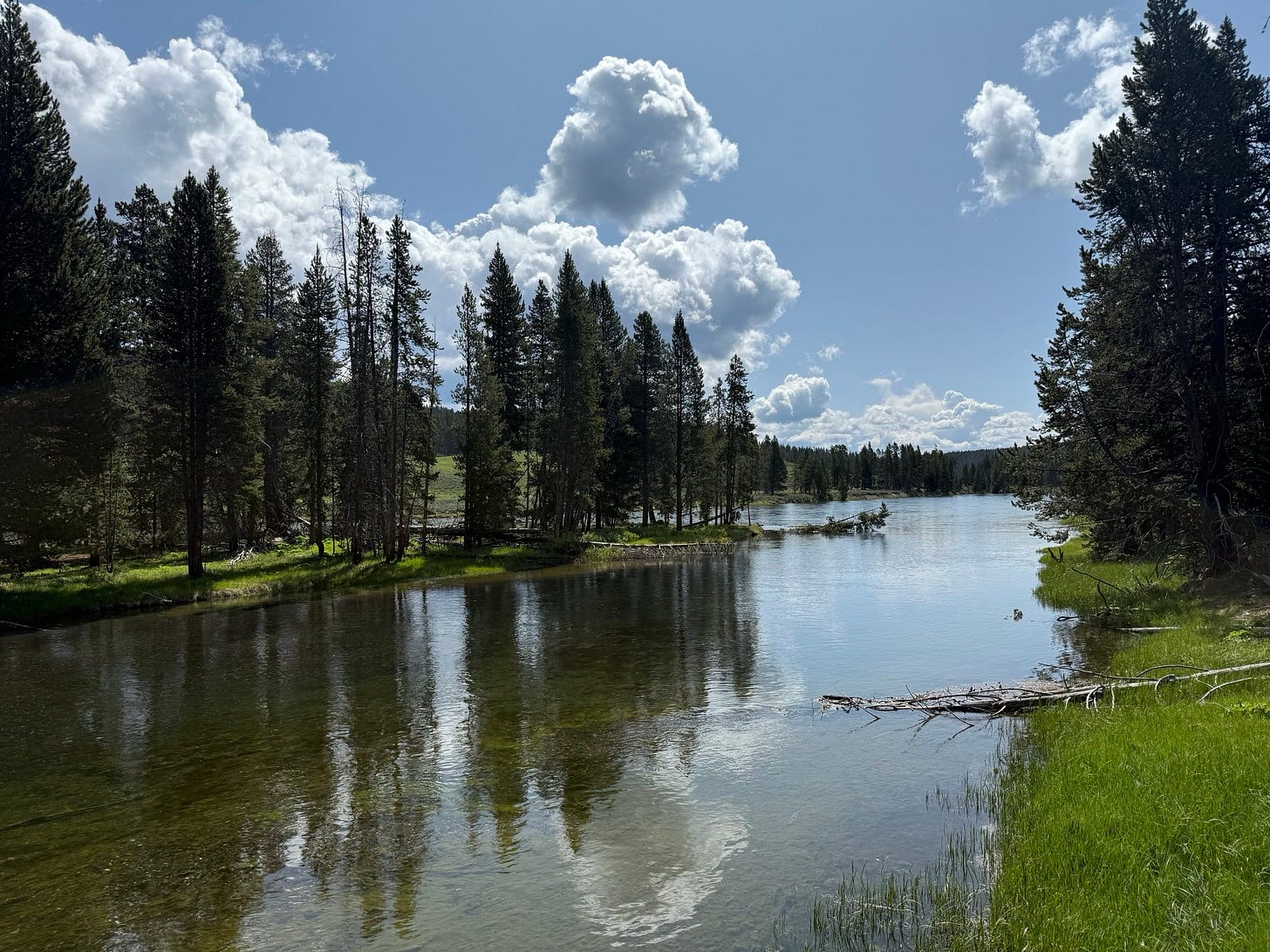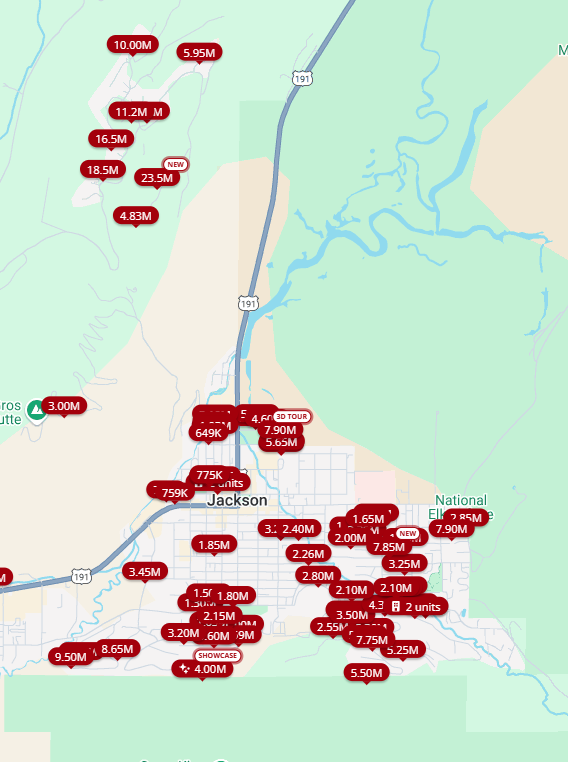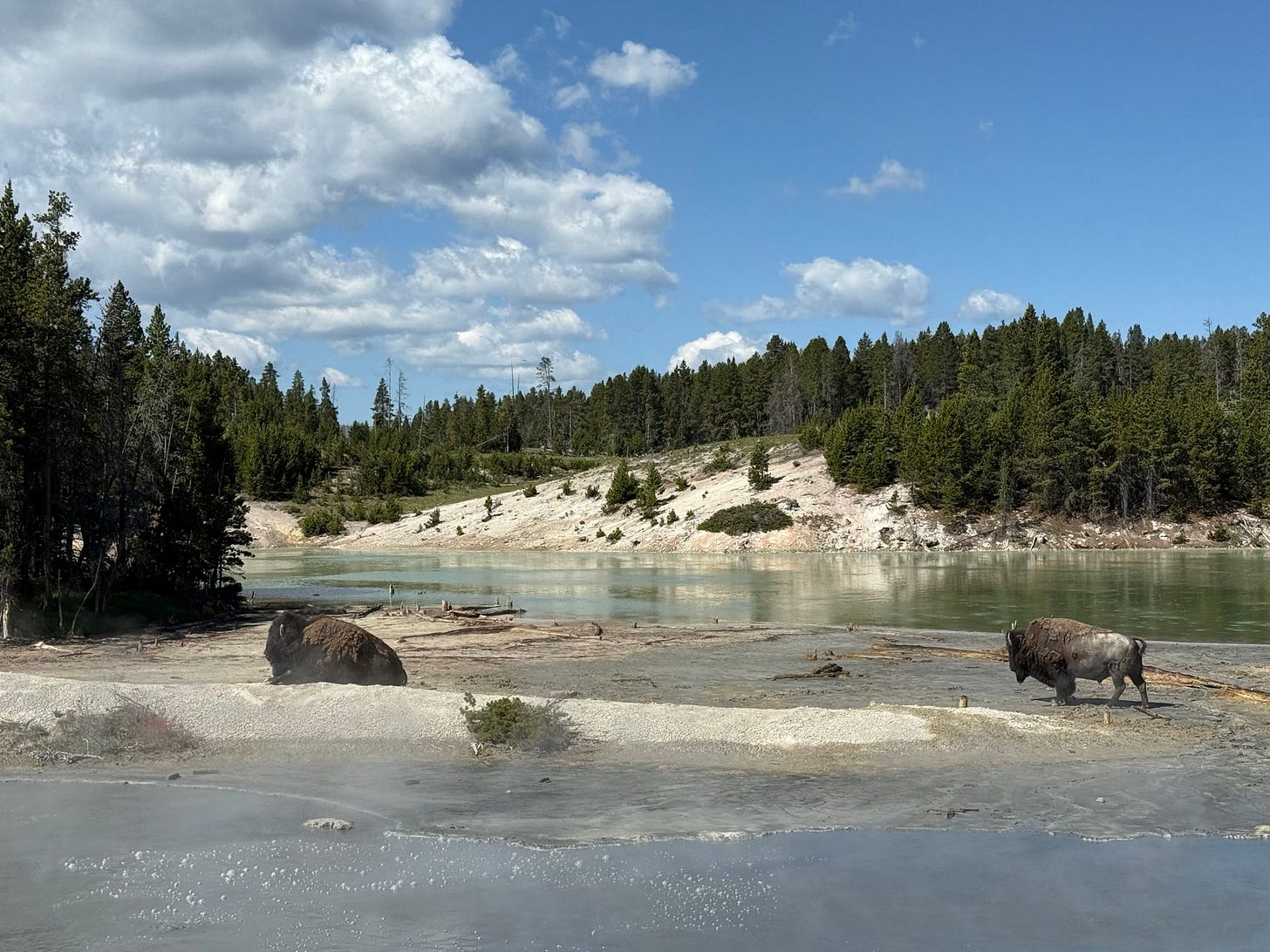Montana and Wyoming Travel Log
Tracking the national vibe shift from Jackson to Whitefish
This trip took place in June, with this post sitting in my drafts as a reminder of what has been an unproductive writing period. I hope you still enjoy it, because this trip has stuck with me as we head into the fall.
In April, I hit my five-year anniversary at my corporate gig, and the milestone created a spiral of sorts. Where had the last five years gone and what would the next five years look like? Should I be grateful for this level of stability, or frightened by it? To answer these questions and more, I needed to get a few miles under my feet. It was time to hit the road to see some of our nation’s finest national parks with my wife and dog, fishing and camping where we could along the way.
2,000 miles later and we’re back in Oregon with a whole heap of thoughts about cultural booms and busts in the west.
Me More Cowboy Than You
I remember changing half of my wardrobe during our European honeymoon just to feel like less of an American. I ended up looking like a slightly better dressed American that trusted linen pants a bit more than he should. I wouldn’t recommend it.
I’ve been tracking the cultural vibe shift away from liberal cities towards small towns. It’s bleeding into our politics, our culture, and unsurprisingly, the tourism rates in rural America. No better place summarizes this shift than Jackson, Wyoming, where true hunters, farmers and cowboys looked to be in short supply.
Situated just south of Grand Teton National Park and Yellowstone, Jackson is nestled between some of the most vibrant mountains in the country. For that reason, it has become the new playground for wealthy coastal elites looking to forget where their wealth and status came from while enjoying the slopes. You can see their impact on the town everywhere, most notably in the real estate prices.
It’s easy to see that everyone wants to fit in. The Brudi Brothers, recent TikTok stars, would be proud of their song if they spent a few hours in Jackson. The wealthy families invading that town have turned it into some mix between Aspen and West Hollywood. Cowboy culture is hawked and appropriated as much as possible. I predicted this in my post about how culture is shifting rightward, but seeing it reflected in the real world was a different type of confirmation.
Whatever remained of the western spirit was isolated to a single bar in the center of town. While mostly a tourist trap now, it was clear that the bar had a history that locals were still proud of. We sat and enjoyed the idea of the town and its past, rather than what it had become. The pursuit was marked by a filled room of tourists, and the few residents who sought to hold back the tide of change flowing through their county.
The city center was reminiscent of Santa Fe, filled with its high-end boutique stores, art galleries and a selection of national brands selling clothes that normal people can’t afford. I expected this popularity, but I was surprised at the coastal sensibilities that had infected the place. We even found a $12 pressed juice shop, which would have done just as well in the gentrified neighborhoods of Portland or San Francisco.
The lost soul of the first stop on our journey put a damper on things. I didn’t expect quite so many nepo babies and members of the Lululemon loyalty program on my trek through the land of the bison and the grizzly bear. I left with the sense that the town’s culture would not survive the property taxes and outsider influence for much longer.
Ruthless Upheaval in the Marketplace of States
Now I will admit, I came to these states with a long-held appreciation for the myths of the American west. Perhaps that makes me part of the problem. I wanted to see a few states that were unabashedly American, especially during a time when it has been hard to feel patriotic. Rural America is unique among the western world due to its size and untouched wilderness, and it’s something to feel proud of. We don’t have trains and tightly packed villages separating our population centers like most of Europe. We have two lane highways, truck stops and an excessive supply of open air.
We found a bit more of that in Montana, powered by a hostility toward any outsiders that looked to change the spirit of Big Sky Country. The residents had a firmer grip on what makes their state special among the other 49. It struck me that the harsh winters were likely an ally for locals, with not many coastal types prepared for the rugged and isolating snow season.
Still, with so many dollars floating around for the top 1% of Americans, the narrative that attaches itself to your home state becomes a bullseye. Build a culture that others envy and you’ll find those looking to change it knocking on your door. Leave your culture up to the whims of modernity and you’ll find yourself looking like every other strip mall-laden town along the interstate. This reality struck me twice as hard given my upbringing in Hawaii, a place that became too expensive for me as the state increasingly hawked its culture to foreign and domestic visitors.
As a gentrification refugee, I feel for these towns. I have an immense respect for the locals that can tolerate tourism while protecting their neighborhoods. When I visit these places, I do my best to leave space for the locals and lend my dollar to the businesses that stick to what makes the place great. Better to support the cash only dive bars, the 6-table diners, the laundromats and local fly shops rather than the upscale, investor-funded money traps that came in after the boom. The competitive marketplace in tourist towns can be brutal because of these outside influences. I hope that these original proprietors can maintain the personality that sustains the unique towns across our country.
How Natural Wonder Can Cut Through Pessimism
Not enough can be said of the natural beauty along our route. The influx of cheap representations and fast tourism created a bittersweet experience in every town. But whenever we got away from people, the trip took on a different flavor.
The vistas were breathtaking, the waterways were clear and filled with fish, and the trails invited a true sense of excitement. We encountered grizzlies, bison, elk and pronghorn along the way, each bringing immense awe to the road trip. The fishing spots and campgrounds were infinite, creating adventure wherever we stopped for the night. In this, I found much of what I was looking for out of the journey.
I don’t know what the next few years will be like in America. Even our small towns are becoming dominated by wealth and privilege, while our big cities become stagnant and combative. Our political system is constantly teetering on the edge of oligarchy and it shows no signs of reversing.
But this trip still made me optimistic by its end. The wilderness of America is one of our last remaining vestiges of excellence. Thanks to a proud and patriotic mix of rangers, guides, indigenous elders and locals, we’re all able to benefit from the feeling of an open sky and a clean river. For anyone who is suffering from a lack of pride in being an American right now, nature and a few thousand miles on the highway would be my prescription.



